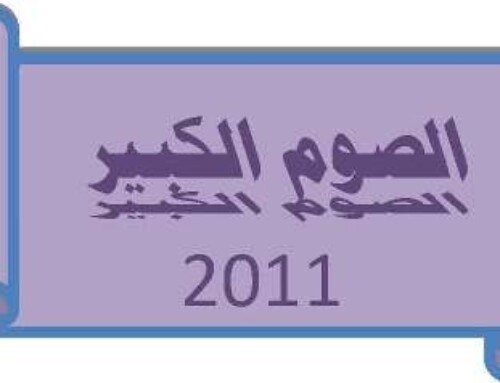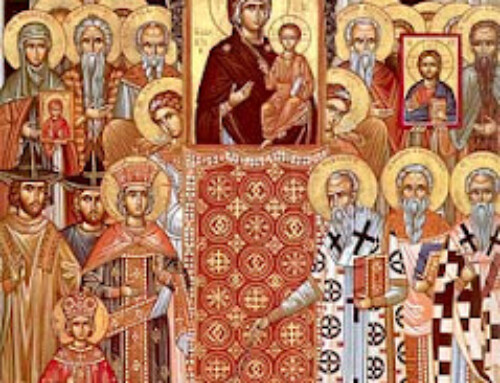From The Word Magazine, March 1965 – Pages 3-4
LENTEN MESSAGE
From Metropolitan Antony
1965
To all the venerable Clergy and Laity within all the constituencies of our Archdiocese in North America — Greetings and Blessings from our Lord and Saviour Jesus Christ…
THE LENTEN SEASON IS WITH US again and we want to devote and rededicate ourselves by life and lips, to the service of God and humanity. We want to make the most of this season of fasting and prayer by sincere efforts to renew our spiritual strength, reinforce our weakened resolves and improve our moral well-being. The fundamental purpose of our religion is to improve the lives of people, to make them stop and think upon their ways, and help them understand the purpose of living. We are responsible human beings, divinely equipped with discerning moral capacities to make right choices and decisions: We are pilgrims and strangers in this world, for it- matters not how long we live, someday we must leave it for another world. Therefore, each of us must face facts about himself, must look into his own heart and life if he honestly wishes for self-improvement. Nobody can improve us without our consent The desire must be there first; self-examination and self-searching is one of the best methods for self-improvement.
Nobody knows your heart and the way you live except God and yourself. But maybe you have not as yet reflected that God has anything to do with your life: what you do is strictly your own business! But is it? The fact that you have not as yet thought that God has anything to do with your life did not cause Him to abdicate. He is not through with you yet. The fact that your conscience reproves you when you do wrong and praises you when you do right shows that in the forum of conscience God is the central figure.
As the underlying purpose of Lent is to face facts about ourselves, to sincerely seek God’s guidance by trying to put our spiritual house in order, we want to devote the time during Lent to discussing some vital issues facing the world today. I don’t believe that the Christian priest should devote his time to the voicing of platitudes. No priest has the right to deal with any subject whatsoever, unless it has direct bearing on the most important subject of all, namely, that of improving man’s spiritual status. It is the church’s and the priest’s primary business, therefore, to inspire people and to lead them along the right path. In other words, sincerity must characterize his every effort, being actuated by the desire to make the will of God the will of man.
In the Bible, which is the greatest authority in the world on right living, we find in Psalm 139: 23, 24, 25, this significant statement: “Search me, 0 God. and know my heart; try me, and know my thoughts: and see if there be any wicked way in me, and lead me in the way everlasting.”
The very first thing that arrests our attention in this marvelous prayer is the desire, the willingness to submit to a searching examination. In order to improve, everyone of us must be made willing to change his way and manner of life if he wishes to succeed and to make progress in the business of living. In other words, self-examination is the first rule toward constructive, creative living. We must, each of us, have audiences with ourselves, face facts even though they lead us to admission of guilt. Self-examination is absolutely necessary unless we want to live in a fool’s paradise, unless we want to practice self-deception. “To thine own self be true.” said the clear-visioned poet. “Then it will follow as the night the clay; thou cannot be false to any man.
Some of us probably think that living a life of duplicity rather than of fidelity is our own affair, that we can do with our lives as we please. The Bible characterizes such persons as fools — lost, unsaved! But to be content with such a sorry, unrepented, unredeemed condition will eventually result in dire consequences. Yes, self-examination leads inevitably to self-revelation. It is the first decision that leads to greater and more momentous decisions along the highway of life, and to nobler and better purposes. The cry of every heart here and of all humanity should be, “Search me, 0 God, and know heart; try me and know my thoughts.”
The second thing that arrests our attention along the line of self-development and worthy attainment is self-conviction. Here we are confronted with a difficult proposition from which we all revolt, for no one is willing to admit his guilt. The hardest thing for any of us to do is concede his guilt. But difficult or not no self-improvement or spiritual development is realizable without it. But by submitting ourselves to be searched by the Divine Spirit who alone can convict of sin, of judgment and of righteousness, we discover that God gives us the grace and the power to admit our guilt and confess our sins and thus find ourselves headed for further achievements and greater conquests.
When we talk about self-conviction, we do not mean lip conviction. but we mean self-conviction based on contrition and sincere desire to lead a better life. We have evidences in the Bible and out of it, yes, in our own experiences, that mere confession of guilt without earnestly trying to forego the sins committed, will profit us nothing.
Pharoah in the days of Moses, after being plagued with his people. with various diseases, was willing to let God’s people go and admitted to Moses that he had sinned, but continued to refuse to let the people go. Judas Iscariot. upon realizing the enormity of betraying the Savior, came to the High Priest and confessed by saying, “I have shed innocent blood,” and instead of repenting of his evil way went and hanged himself.
It is not enough to say we are sorry for what we have done. But we must take hold of our sins, and by the help of God, pluck them out by the roots and say, “0 God, here is my trouble. help me to lead a better life; give me the strength and the power to renounce it and have no fellowship with it forever. God be merciful to me, a sinner, but, one who is aware of my weakness, as I am aware of your strength; uphold me by thy mighty spirit to live a life that will declare your glory and make my people and my loved ones proud of me.”
At the close of his eventful life, Rev. Father Matthew, the apostle of temperance went to reside at Queenstown, where he was often seen loitering about the town. A friend calling to see him one day found him at his devotions. The friend offered some apology for disturbing him at such a time, but the eloquent priest answered,
“You must join me in my prayers to God, pray for me,”
“For you, sir?”
“Yes, I was praying that God would prepare me to leave this world and would forgive me for the sins I have committed.”
“But what necessity is there for my praying for you, Rev. Father Matthew, you who have done so much good for mankind?”
“No. I have done nothing, and no one can be pure in the eyes of God. Kneel with me and pray with me to the Father of mercy.”
Self-examination and self-conviction lead to the third important, inevitable step — self-realization. Self-realization is that knowledge and that awareness of ourselves which up until now had been hidden behind the mist of selfishness and worldly -pleasure. It is when a person arrives at that stage in life when he feels an impelling, constraining force of self-revelation that changes his attitude and his outlook on life. It is that turning point in life when one realizes that life has meaning indeed, that there is a purpose and plan, and that there is a Great Architect who wills the best for His children. Things and people become meaningful where they were meaningless. The cry of the sin-scarred, sin-battered Prodigal will then find an echo in your heart. It grips and when it is wrung out of your heart and lips, “I will arise and go to my father, and will say unto him, ‘Father, I have sinned against heaven, and before thee, and am no more worthy to be called thy son; make me as one of thy hired servants.’”
May God help each of us to avail himself during this season of the opportunity and privilege that are ours as God’s children. May we live up to our obligations as Christians and fellow-citizens of His blessed Kingdom; May God take charge of our lives and conduct them in a manner that will be acceptable to Him.
Now unto Him that is able to keep you from falling, and to present you faultless before the presence of His glory with exceeding joy.
To the only wise God our Savior, be glory and majesty, dominion and power, both now and ever. Amen.
+ Metropolitan Antony



